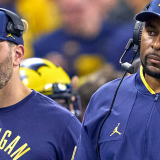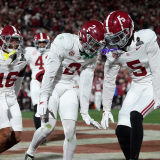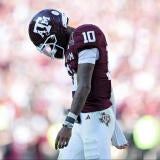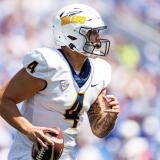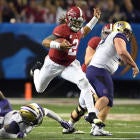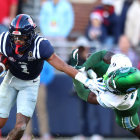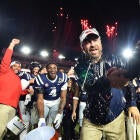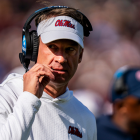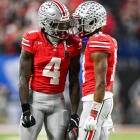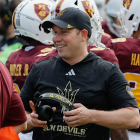Six new faces who will help decide the Alabama-Clemson national title rematch
From coordinators to star players, the Tide vs. Tigers rematch is looking quite different

The teams are the same at this year's College Football Playoff National Championship, but Alabama-Clemson II features six prominent people who didn't participate in the Crimson Tide's 45-40 victory over the Tigers last season.
We all remember Deshaun Watson's 478 total yards, O.J. Howard's five catches for 208 yards and two scores, Hunter Renfrow's two brilliant touchdown catches, and Marlon Humphrey's onside kick recovery from Nick Saban's bold call. They're all back.
Eleven Clemson starters and nine Alabama starters return from the 2016 classic.
But it's how these six people perform next Monday that will go a long way toward determining the next national champion.
1. Alabama offensive coordinator Steve Sarkisian
On Jan. 9: Sarkisian is front and center for arguably the most unusual debut as a play-caller we've ever seen. There's no template for what Saban is trying to pull off by changing offensive coordinators one week before the national title game. This just doesn't happen.
Things got so bad with Lane Kiffin that Saban believes it's better to switch to Sarkisian now instead of after the season. Before the Peach Bowl last week, Kiffin said Sarkisian was in charge of third-down offensive strategy. Alabama converted 46.1 percent on third down in 2016 (21st nationally), up from 37.4 percent in 2015.
"Off the field, I'm sure if he could write a script, [becoming Alabama's offensive coordinator] is how he would have wrote it," Kiffin said last week. "'I'm an offensive coordinator again' vs. having to go be a position coach again in less than one year, and it's at the best place in the country and with the best head coach. I was really happy for him. I think he'll play to the strength of the players. He always has."
If Sarkisian starts his Alabama tenure by winning a national championship, he'll immediately create a place for himself in Crimson Tide lore. Kiffin should be Sarkisian's biggest fan. An Alabama loss -- whether Kiffin had stayed or left -- will be viewed by many Crimson Tide fans as an indictment on Kiffin due to his distractions.
Where he was last January: Sarkisian had just sued USC for the remaining $12.6 million on his contract plus unspecified damages from his firing. Sarkisian claimed USC dismissed him in October 2015 rather than allow him to seek treatment for alcoholism. USC called the lawsuit "full of half truths" and "outright falsehoods." The case got very public over Sarkisian's charges of discrimination based on disability and breach of contract.
Sarkisian claimed he didn't recall signing a two-page agreement when he was hired to arbitrate almost all claims against USC. His attorneys argued the agreement was "unconscionable" and "unenforceable." USC's attorneys responded by warning, "Presumably, Mr. Sarkisian, who is currently looking for new coaching opportunities, would have an interest in preserving the confidentiality of his alleged substance abuse and treatment."
Sarkisian agreed to arbitration in March, pushing the case out of the public eye. The lawsuit said Sarkisian completed treatment and was ready to coach again. As recently as last August, Sarkisian considered becoming a broadcaster for Fox Sports. Instead, Alabama hired him as a $35,000-a-year analyst -- a behind-the-scenes job where NCAA rules don't allow him to coach the players.
2. Alabama running back Bo Scarbrough
On Jan. 9: A case could be made that other than Watson, Scarbrough is the most important player in Alabama-Clemson II. Coming off a 180-yard rushing game against Washington, Scarbrough could be fed a lot of carries given quarterback Jalen Hurts' struggles in the passing game. "He's an animal," Alabama offensive lineman Jonah Williams said of Scarbrough. "That's just a big dude with big ol' arms."
Alabama rotated running backs much of this season, so Scarbrough only received 9.1 carries per game while picking up 6.6 yards per carry. He sprained his knee against LSU on Nov. 5 but came on late. He averaged 120.3 yards per game and 7.7 yards per carry in the last three games against Auburn, Florida and Washington.
"He's got great size and speed," Saban said. "He can run behind his pads. He's got good vision. He's a good receiver and he can block. So he can do all the things that any good running back can do."
Clemson has the 19th-rated rush defense, but it's been vulnerable at times against elite running backs. Florida State's Dalvin Cook ran for 169 yards and four scores on 19 carries against Clemson. Pittsburgh's James Conner gained 132 yards on 20 carries in Clemson's only loss.
Saban traditionally rides hot hands at running back. Scarbrough will no longer be a tall tale at this year's national championship game like he was last season as fans kept hearing about his tremendous athleticism and incredible strength without seeing it on the field.
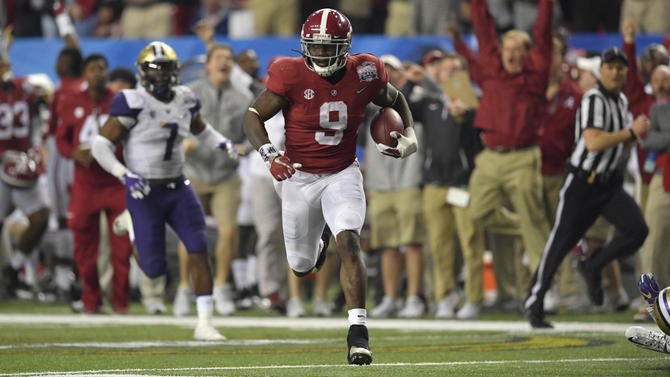
Where he was last January: Scarbrough was a cult hero, though he only had 18 carries while working behind Derrick Henry, who won the Heisman Trophy. But at 6-foot-2 and 240 pounds, Scarbrough represented the tantalizing future with a bench press of 475 pounds, a squat of 540 pounds and a 40-yard dash clocked around 4.4 seconds.
Scarbrough didn't exactly come out of nowhere. He was 247Sports' No. 2 athlete and No. 16 overall player in 2014. Still, the legend of Bo grew. One of his assistant coaches at IMG Academy told Bleacher Report on the eve of the Clemson game that Scarbrough reminded him of Adrian Peterson.
Due to academics, Scarbrough didn't enroll at Alabama until the spring of 2015, missing all of what would have been his freshman season. He tore his ACL during spring practice. Then he got suspended four games by the NCAA for recruiting violations unrelated to Alabama, according to Saban. Nagging injuries kept popping up, but Alabama never redshirted Scarbrough, perhaps a sign that he'll turn pro after 2017 no matter what.
Scarbrough wasn't needed last year against Clemson, not with Henry and Kenyan Drake running the ball. That's totally different this year.
3. Clemson wide receiver Mike Williams
On Jan. 9: Williams is one of the game's most dangerous receivers and the go-to option for Watson that he didn't have against Alabama last year. Williams has 90 catches for 1,267 yards and 10 touchdowns. He can catch slants and run away from people, beat coverage on back-shoulder throws, or attract two defenders to open up space for Jordan Leggett, Artavis Scott, Deon Cain and Renfrow.
In the offseason, Williams often got together with Watson at night to throw passes. Watson has the key to Clemson's indoor practice facility, so, "We'd go in late at nights, turn on the music and throw a lot of balls," Williams said. "Just trying to get that feeling back of running routes. It helped."
Clemson coach Dabo Swinney said Williams practiced harder when he returned because he almost lost football after suffering a serious neck injury early last season. Swinney knew for sure that Williams was back when he instinctively dove for a ball early in spring practice. While everyone held their breath, Williams popped right up.
"I think he's the most complete receiver we've had," Swinney said. "Part of that is we had him for four years. We didn't have Nuke [DeAndre Hopkins] for four years. We didn't have Sammy [Watkins] for four years. I think [Williams] has a chance to really be a special guy moving forward because of his knowledge."
Williams doesn't want to watch the video of his scary injury. "I don't really want to see it like that, but it don't do nothing to me to watch it, though," he said. Then his eyes lit up and he laughed. "It was a touchdown, so it's a career stat."
Where he was last January: In Clemson's heartbroken locker room after the Alabama loss, Williams made a point of telling each returning player they'd be back for another shot at the national title. Williams, who may be the first wide receiver picked in the NFL Draft this year, wanted a shot himself. He missed virtually all of 2015 with a fractured bone in his neck after he caught a touchdown and ran into the goal post on the first drive of the season.
"It was tough watching on the sideline knowing you could be out there helping the team, but we were winning games, so I was like, 'Good job,'" Williams said. "Then in the national championship we lost, I thought, 'What if I had been out there? Maybe that would have been a different outcome.'"
Williams initially thought his neck injury was just a bruise. "Mike's a little over-reactor, so I thought he was being a little drama queen," Renfrow said. "Then they took him off the stretcher and I went over there, and he's laughing. He didn't take it as a joke, but he's like, 'It's pretty cool everybody's looking at me while I'm in a neck brace and I'm getting carted off the field. The attention's on me.'"
Williams told the trainer his body felt numb. "I'm glad I told them the truth because what if I had just walked off the field and didn't know what was wrong with me?" he said. "That would have been a bad situation."
Williams said his neck injury was similar to what Baylor quarterback Seth Russell sustained in 2015. Unlike Russell, Williams opted against surgery because he said it wouldn't have made a difference. He was supposed to do nothing active and let the neck heal, but admitted he tried to accelerate his return to play in the 2015 playoffs.
"When nobody was watching, I was taking my neck brace off, to be honest, when I wasn't supposed to," Williams said. "Just doing push-ups, doing sit-ups, doing neck rotations, just trying to get my neck right and stay in shape."
4. Alabama quarterback Jalen Hurts
On Jan. 9: At 18 years old, Hurts is the first true freshman quarterback to ever win the SEC Championship. He could be the first true freshman quarterback with a national title since 1985. He was the SEC offensive player of the year. He's a dynamic runner with good poise for his age.
Yet the questions keep building for Hurts entering the game against Clemson, which ranks fourth nationally defensively in yards allowed per play. In four games against top-25 defenses, Hurts is a 62-percent passer with three touchdowns, three interceptions and 147 passing yards per game. Against everyone else, Hurts completes 66 percent with 19 touchdowns, six interceptions and 206 yards per game.
Hurts regressed in the CFP Semifinal against Washington. He appeared to struggle reading defenses, especially after his first throw nearly got intercepted. Alabama played its offense very conservatively. Now his offensive coordinator is abruptly gone.
"When I came in, [Kiffin] taught me some stuff and he still is teaching me some stuff," Hurts said last week. "Like [his father] always says, 'He's going to be leaving in a few weeks, so use him while you can.'"
It turns out Kiffin is gone sooner than that. Hurts said before the Peach Bowl he had yet to do research on whether Sarkisian has coached true dual-threat quarterbacks. "I'm interested in seeing how that goes," Hurts said. "He's a smart guy so I know he'll be all right."
Where he was last January: Before he ever squared off against Watson, Hurts mimicked Watson. As an early enrollee last year, Hurts played the role of scout-team quarterback before last season's championship game.
Hurts carried a bit of a chip on his shoulder. Though he was a four-star recruit out of Texas, he didn't get invited to high-profile high school events like the Elite 11, The Opening or All-American games.
"It's kind of the underdog mentality to me when it comes to that because coming out I wasn't that big-time guy," Hurts said. "As a competitor, I wanted to be the best. I knew it's about what you did on the field and all the other hype didn't matter."
5. Clemson defensive lineman Dexter Lawrence
On Jan. 9: Lawrence ranks fourth on the team in tackles (74), second in sacks (seven), first in quarterback pressures (20), tied for first in fumble recoveries (two) and first in blocked kicks (two). He had a quiet Fiesta Bowl. No problem. Redshirt freshman defensive end Clelin Ferrell, another new face that didn't play Alabama last year, was the defensive MVP with three tackles for loss against Ohio State.
Lawrence said he's still adjusting to work on his footwork, hand placements and being smarter at reading the offensive line. He never needed those skills while overpowering high school players.
"I just flew around like crazy with no discipline," he said. "Now I have to know gap control, how to move my feet better, how to stay square to the run. Just the little things knowing that I don't have to make that play if that's not my play."
Swinney said he has never been around a freshman who's as big and mobile as Lawrence. "He's kind of like Deshaun at his position [as a freshman], but Deshaun physically had to develop," Swinney said. "Dexter, we just kind of got him out of the box, no assembly required, boom, ready to go."

Where he was last January: Like Hurts, Lawrence arrived at college last year at this time as an early enrollee. Clemson immediately saw how talented Lawrence is at 6-foot-5 and 342 pounds.
Swinney said Lawrence can already bench 225 pounds 32 times. Lawrence's first body fat test was 18 to 19 percent, which "a lot of us would fail that right now," Swinney said. Teammates couldn't believe how easily Lawrence beat Clemson's big offensive guards (340-pounder Tyrone Crowder and 325-pounder Taylor Hearn) at practices.
"I really think he can be the No. 1 pick in the draft one day," Clemson defensive tackle Carlos Watkins said. "I really, really do. He's a freak athlete. He's a man child is what I think of when I see him."
6. Alabama defensive coordinator Jeremy Pruitt
On Jan. 9: The comfort level of Alabama players with Pruitt was on display in front of the media at the Peach Bowl. Defensive lineman Da'Ron Payne interrupted Pruitt to ask him a question.
"Sir, we know you coach a good defense, but how do you tackle that bald head in the morning?" Payne asked. "What shaving cream do you use?"
Said Pruitt: "I don't use any. That's old school. Just good, old-fashioned soap."
Alabama players seem incredibly comfortable with Pruitt, perhaps even more so than under Kirby Smart. Linebacker Tim Williams told AL.com that, "Kirby is The General. He's about his business. Kirby is just like Saban. He's like a little Saban." And Pruitt? "He's like a magnet. You want to be around him."
Under Smart last season, Alabama ranked second nationally in points per game (15.1), yards per carry (2.43) and yards per play (4.3). Pruitt's defense has managed to improve on that to lead the nation in all three categories: 11.4 points, 2.0 yards per carry, 3.86 yards per play.
"He just simplifies a lot of things so we can play faster and get more guys on the field and give us more depth," linebacker Ryan Anderson said.
Clemson has been held to 14 points or less only twice since 2012. Once was Georgia Tech in 2014. The other was by Florida State with Pruitt in 2013. If Pruitt does it again, he'll have a great shot to join Smart and Will Muschamp as the only defensive coordinators to win a national title under Saban, paving the way for Pruitt to be a head coach one day soon.
Where he was last January: Pruitt was Alabama's defensive coordinator in waiting. He left Georgia after two seasons as an obvious choice given his previous time on Saban's staff from 2009-12.
But Pruitt couldn't start coaching the Crimson Tide until Smart, the outgoing coordinator, left to become the Bulldogs' coach. Smart stayed through the playoff and his defense got shredded by Watson. If not for Saban's onside kick to steal a possession in the fourth quarter, the last memory of Smart in Tuscaloosa might not have been very good.
Everywhere he's gone, Pruitt improved defenses. He won the national title at Florida State in 2013 with a unit that led the nation in points allowed (12.1 per game), up from 14.7 before he came. At Georgia, Pruitt inherited a defense that allowed 29 points per game (tied for 79th nationally), improving to 20.7 points in Year 1 and 16.9 points in Year 2. The same has been true even with Alabama's historical excellence on defense.



